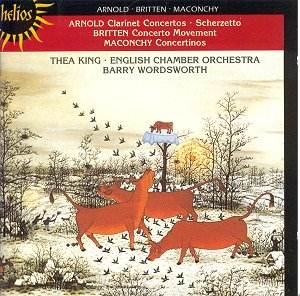A quarter of a century (1948 & 1974 respectively)
separates Malcolm Arnold’s two clarinet concertos and unsurprisingly
they present very different styles and moods. The first concerto, written
during the immediate post-war austere conditions in Britain, hints at
the rhythmic influences of Bartok, not to forget Arnold’s own considerable
mood-swings, whilst the second concerto has both a divine slow movement
and jazzy finale, memorable for war whoops on the horns. The brief Scherzetto
comes from the film You know what sailors are (1953), whose
title leaves nothing to the imagination but underlines Arnold’s expertise
in the film music genre. Maconchy’s music is just as skilled in its
craftsmanship and again both works (1945 & 1984) are separated far
enough to encapsulate the span of her creative styles. Once again Bartók’s
influence pervades the earlier work but with the addition of Hindemith
and with purely strings to accompany, whilst the later one expands this
scoring to a small orchestra of standard classical proportions (with
the exception of one trumpet instead of two) and adopts a style which
has taken account of progress in the intervening years, not the least
of which included her own daughter’s music (Nicola Lefanu). Britten’s
movement (1942/43) was orchestrated by Colin Matthews in 1989. It is
the only surviving fragment (and in short score) of a projected concerto
for Benny Goodman. When Britten went to the US during the war the manuscript
of this work was stupidly impounded by over-zealous customs officials
who suspected encoded messages in their notes and musical instructions.
When it was returned to him some months later, the composer seemed to
have lost interest in further work, though a little time was devoted
to it while he was recovering from measles in a South London hospital
in March 1943.
This is a delightful disc. All the works compelling,
charming and highly approachable with supreme playing from Thea King.
Her link with the music is underlined by her relationship to one of
the finest clarinettists this country has ever produced, Frederick Thurston.
Thurston was her teacher and husband. He died prematurely nearly half
a century ago in 1953 and the age of only 52. For 16 years the principal
clarinet of the BBCSO, then of Walter Legge’s star-studded Philharmonia
Orchestra, as well as a chamber musician of considerable note, Thurston
was also devoted to the cause of contemporary British music in his day.
He encouraged not only the composers featured here but also Finzi, Bax,
Ireland, Bliss, Howells, Rawsthorne, Hamilton, and Jacob to write for
the clarinet. This fine recording, with superlative support from the
English Chamber Orchestra under Barry Wordsworth, is as much a tribute
to the Thurstons as to the composers whose music is played.
Christopher Fifield

![]() Thea King (clarinet)
Thea King (clarinet) ![]() HYPERION CDH55060 [64.35]
HYPERION CDH55060 [64.35]